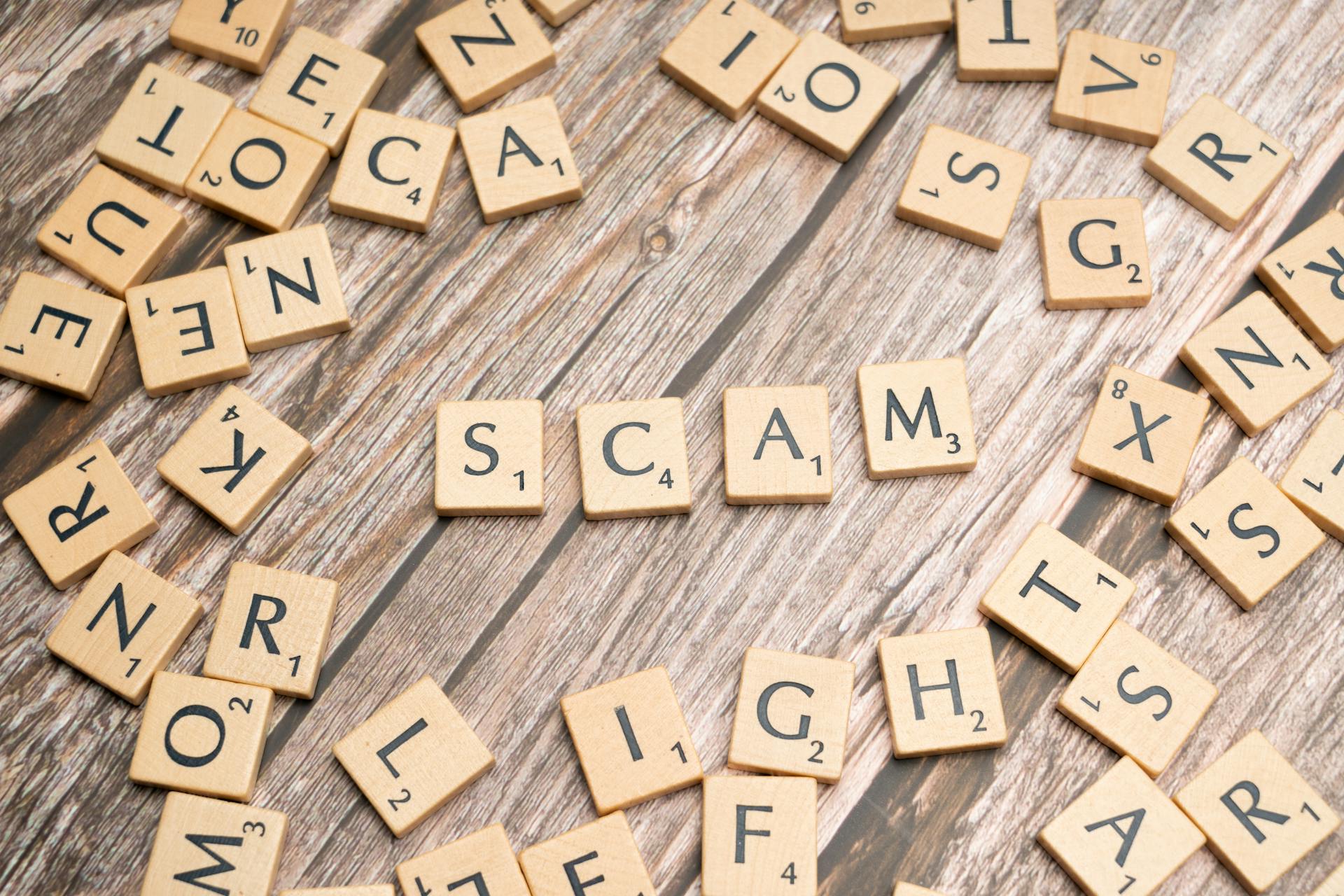
Huntington National Bank scams are on the rise, targeting unsuspecting consumers with fake calls and emails.
Scammers often use fake caller IDs to make it seem like the call is coming from Huntington National Bank.
Consumers have reported receiving calls from scammers claiming to be from the bank, asking for sensitive information like account numbers and passwords.
These scammers are trying to steal your money and identity, so it's essential to be cautious and protect yourself.
Huntington Bank Scams
The Better Business Bureau Serving Northern Indiana has received over 50 reports of a scam targeting Huntington National Bank customers. The scam involves a letter thanking customers for opening an account with Huntington National Bank, but in reality, the customer didn't open the account.
To verify if a fraudulent account was opened in your name, contact Huntington National Bank directly. The letter asks for a deposit to be made, warning that accounts with a $0 balance will close within 90 days.
Some text messages claiming to be from Huntington's "Security Department" or "Help Desk" are actually phishing attempts. These messages request personal information such as account numbers or social security numbers.
Broaden your view: Wells Fargo Customers Are Suing the Bank over a Scam.
Consumers Hit by Fraudulent Texts
Consumers have been hit by fraudulent texts claiming to be from Huntington Bank and other financial institutions. These texts request personal information, such as account numbers and social security numbers.
The texts often appear to be from the "Huntington National Bank Help Desk" or the "Huntington Security Department." They may also include a sense of urgency, warning that the consumer's account is at risk if they don't respond.
Huntington Bank has issued a warning to its customers, advising them to disregard any texts that ask for personal information. The bank will never contact customers for this type of information.
To verify the authenticity of a text, consumers should call the phone number on the back of their ATM or debit or credit card, or their bank statement. This will help them confirm whether the text is legitimate or not.
Some counterfeit texts may even use the bank's actual logo and other information to fool consumers. To stay safe, consumers should never click on links in text messages or email messages.
See what others are reading: Virtual Bank Account
BBB Warns: Huntington Bank Scam
The Better Business Bureau Serving Northern Indiana has issued a warning about a scam targeting Huntington Bank customers. The scam involves a letter sent to customers thanking them for opening an account with Huntington National Bank, even if they didn't.
This letter asks customers to make a deposit to avoid their accounts being closed within 90 days. However, this is a scam and customers should contact the bank directly to confirm. Don't let the scammers get away with it – take control of your account by verifying its status.
The BBB Serving Northern Indiana has received over 50 reports of this scam just this week. Be cautious and don't fall for it. If you receive a letter like this, don't hesitate to contact the bank to ensure your account is legitimate.
Here's a list of red flags to watch out for:
- Letters or emails thanking you for opening an account you didn't open.
- Requests for deposits to avoid account closures.
- Urgency to respond quickly, often with a deadline.
Stay vigilant and protect your account from scammers. Remember, Huntington will never ask you for account numbers or passwords by phone, email, or text.
A fresh viewpoint: Joint Bank Account
Phishing Scams
Phishing scams are attempts by someone to deceive you into disclosing personal or financial information that they can use to steal your money, identity or both.
These scams can come through emails, phone calls, and texts, targeting all ages, all income levels, and businesses as well as individuals.
Fraudsters often pose as someone you know, or as a legitimate company such as your bank, asking you to provide or verify personal information like a Social Security Number, account numbers, and/or password/login information.
Phishing emails are designed to look legitimate, tricking you into giving out personal or financial information, or clicking on a malicious link.
Check this out: What Is Personal Banking
Fake Banking Threats
Fake banking threats are real, and they can be sneaky. Fraudsters may develop fake mobile banking apps that look like the official Huntington Mobile Banking app to collect your personal info.
The official Huntington Mobile App is only available from the Apple App Store and Google Play, so be wary of apps advertised on third-party sites.
You might like: Difference between Online Banking and Mobile Banking
If you receive a letter in the mail from Huntington National Bank about opening an account, but you didn't, it's likely a scam. The Better Business Bureau Serving Northern Indiana has received over 50 reports of this exact scam.
The scam letter thanks you for opening an account, then asks for a deposit, warning that accounts with a $0 balance will close within 90 days.
Don't fall for it - contact the bank directly to ensure a fraudulent account wasn't opened in your name.
Frequently Asked Questions
Does Huntington Bank text you about suspicious activity?
Yes, Huntington Bank offers Confirm It fraud alerts that notify you of suspicious activity via text, email, and/or automated phone call. You won't be charged for these alerts, which are sent based on your card use.
How do you know if a bank is scamming you?
Be cautious of sudden requests for money or personal info from unfamiliar sources, as scammers often disguise themselves as banks. Verify the authenticity of the request and contact your bank directly to confirm its legitimacy
Sources
- https://www.cleveland.com/business/2017/08/consumers_hit_by_fraudulent_te.html
- https://www.huntington.com/Privacy-Security/prevent/phishing-scams
- https://www.wpxi.com/news/local/officials-warn-new-phishing-scam-get-bank-information/Z55R6ZMXLZEYROGU2JCSHP4VA4/
- https://www.wane.com/top-stories/bbb-warns-of-huntington-bank-scam/
- https://www.newsbreak.com/geauga-county-oh/3351798448326-scam-warning-for-huntington-bank-customers
Featured Images: pexels.com


